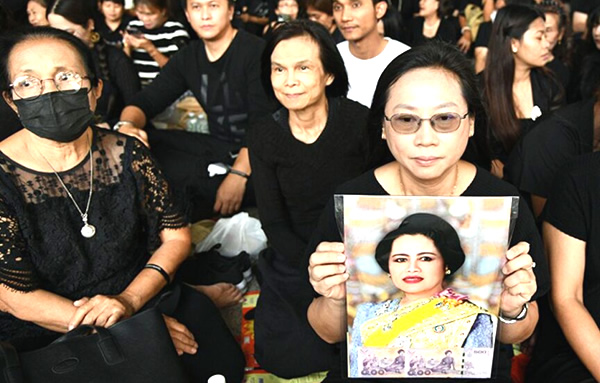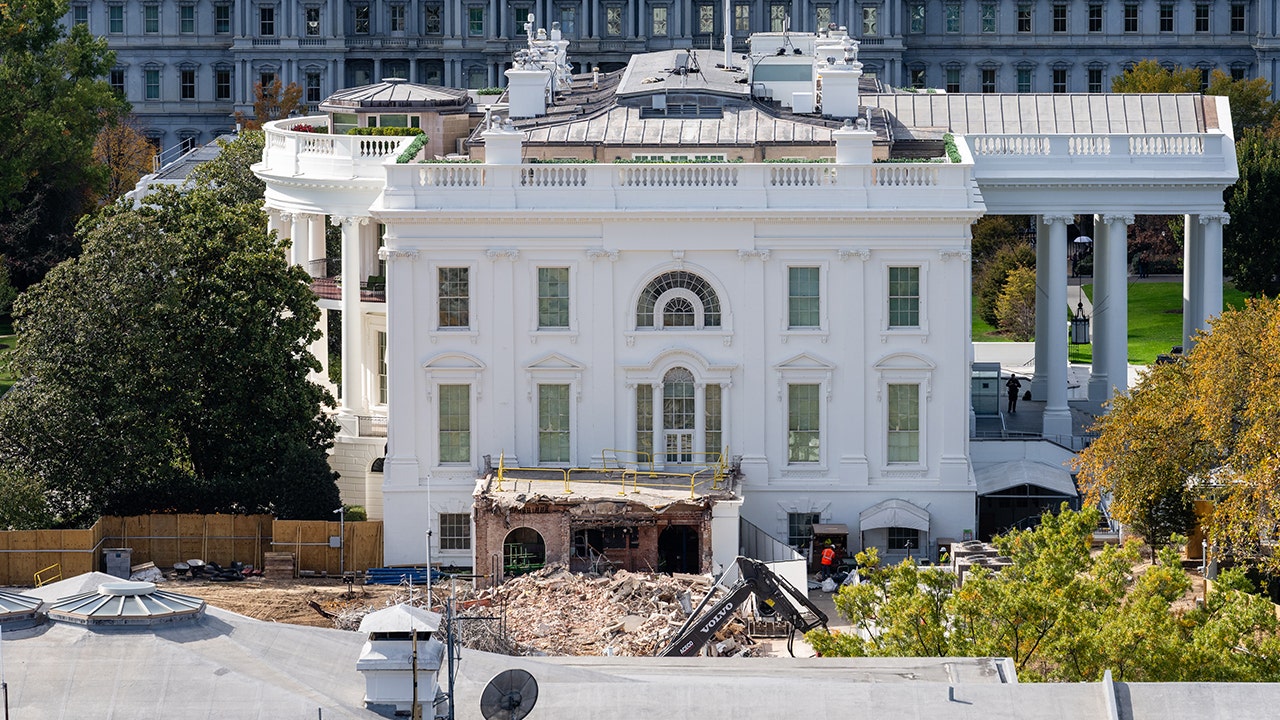Copyright thaiexaminer

Thailand plunges into deep mourning as Queen Sirikit, the Queen Mother, dies at 93 years old. Thousands of citizens line Bangkok streets in black to honour the nation’s mother, her lifelong devotion, royal service, and enduring legacy with King Bhumibol. Grief has swept across Thailand since the death of Her Majesty Queen Sirikit on Friday. The Queen Mother, who stood unwavering beside King Bhumibol Adulyadej the Great for more than six decades, is mourned as the nation’s heart and conscience. On Sunday, as her funeral procession moved through Bangkok, silent crowds lined the streets, recalling how the royal couple travelled to Thailand’s farthest corners, bringing hope, dignity, and compassion to the people. Queen Sirikit married the young King in 1950 after meeting him in Switzerland, when her father served as Thai Ambassador to France. Now, as black drapes the nation and prayers rise from temples, Thailand begins a year of mourning for its beloved Queen Mother—Her Majesty Queen Sirikit—whose death at 93 marks the end of an era and the loss of a mother to her nation. Unable to hold back tears, thousands of citizens dressed in black streamed toward King Chulalongkorn Memorial Hospital at dawn on Sunday. They came to join the royal funeral procession for Her Majesty Queen Sirikit, the Thai Queen Mother, whose death has plunged the kingdom into deep mourning. Many carried portraits of Her Majesty pressed tightly to their chests, whispering prayers and crying quietly as they approached the hospital gates. From early morning, the atmosphere at the Bhumisiri Mangkalanusorn Building was filled with grief and reverence. Inside the hospital, a large portrait of the Queen Mother stood surrounded by white jasmine flowers. Nation mourns as Queen Sirikit’s passing draws thousands to hospitals and temples across Bangkok Officials from the Thai Red Cross Society arranged a special area where citizens could pay their final respects from eight in the morning until noon. After that, the crowd never thinned. Lines of mourners extended outside the building, forming a continuous black ribbon of sorrow along Rama IV Road. According to the Bureau of the Royal Household, Her Majesty Queen Sirikit, the Queen Mother, passed away peacefully at 9:21 p.m. on October 24, 2025, at the age of 93. The Bureau’s official statement explained that Her Majesty had been hospitalised since September 2019 and had been under constant medical care. Since October 17, she had suffered from sepsis, or a severe bloodstream infection. Despite continuous treatment, her condition worsened until she passed away quietly on Friday night. His Majesty King Maha Vajiralongkorn has commanded that the royal funeral be conducted with the highest honours and full royal tradition. The royal body will be moved to the Dusit Maha Prasat Throne Hall inside the Grand Palace, where it will lie in state for one year before cremation. Members of the Royal Family and royal servants will observe mourning for a full year. Outside the hospital, people from all walks of life gathered side by side. Elderly women sat on mats laid on the pavement. Monks chanted prayers from nearby temples. Soldiers and volunteers helped distribute water and flowers to mourners who had travelled from distant provinces. Every few minutes, the sound of crying could be heard. Even hardened police officers turned away to wipe their eyes. Royal funeral announced as grief deepens and Thais from every walk of life gather to pay their respects Among the mourners was Ms. Suthisa Traikisayasophon, who came with her sister at dawn. “Her Majesty the Queen Mother is like the Mother of the Nation,” she said softly. “I remember her endless journeys with King Rama IX. She went everywhere, even to the remotest villages. When I heard the news of her passing, I was shocked and heartbroken. It felt like a lightning bolt striking our hearts. We knew this day would come, but we were never ready.” Beside her, 63-year-old teacher Mrs. Uraiwan Phaitchan from Samut Prakan spoke with a trembling voice. She and her colleagues had taken leave from school to travel to the hospital. “Her Majesty taught us about nature and about kindness,” she said. “We always teach our students about her forest conservation work. She encouraged us to protect the environment, to plant trees, and to care for the earth. She also supported weaving and craftwork that gave villagers new livelihoods. Her Majesty gave dignity to ordinary people. We will pass her lessons to the next generation.” In another corner, 70-year-old Ms. Anchalee Sorasit knelt holding a candle. “I once saw Her Majesty in person,” she recalled tearfully. “When I heard the bad news, I couldn’t stop crying. She was truly our mother. She taught us to be honest, to do good, to never take advantage of others. I will follow her teachings as long as I live.” Others echoed the same sentiment. One man said he had just been discharged from the hospital, but came back despite his frail health. “I wanted to see her off,” he said. “It’s my duty as a Thai citizen. Her Majesty gave her life to us. The least I can do is to bow one last time.” Citizens share heartfelt memories of the Queen Mother who inspired loyalty, compassion and national pride As the morning wore on, more people arrived. By noon, thousands filled the surrounding streets. Every face reflected the same profound sorrow. For many, this moment revived memories of the 2016 funeral of King Bhumibol Adulyadej, her beloved husband. Once again, Bangkok became a city in mourning. At four in the afternoon, the royal procession departed from Chulalongkorn Hospital. Along the route to the Grand Palace, mourners knelt in silent rows. The crowd was so dense that traffic came to a halt. Soldiers in white uniforms marched slowly beside the royal vehicle, which carried the Queen Mother’s body draped in the royal flag. The air was still. Even the wind seemed to pause as the convoy passed. Inside the Grand Palace, officials prepared the Dusit Maha Prasat Throne Hall to receive the royal body. The hall, adorned with golden spires and white floral arrangements, will serve as the site for public mourning throughout the year. Hundreds of black-clad citizens entered the palace grounds to pay their respects even before the procession arrived. Many bowed low before ornate portraits of the Queen Mother framed in gold. Meanwhile, tributes to Her Majesty filled every corner of the capital. Black-and-white images of the Queen Mother appeared on towering digital billboards, on television screens, and across mobile banking apps. Streets fall silent as the Queen Mother’s royal procession turns Bangkok into a city draped in sorrow Supermarkets, hotels, and schools played solemn music. Broadcasters switched to monochrome. Citizens were urged to wear black or white and to refrain from celebrations for 90 days. Across Bangkok’s shopping districts, at least half of the people were seen wearing mourning clothes. Even at entertainment events, organisers asked audiences to dress in black to honour her memory. Prime Minister Anutin Charnvirakul described her passing as “a profound loss for the Thai nation.” He later postponed his trip to the ASEAN summit in Malaysia to attend the early ceremonies. In his statement, he praised Her Majesty’s lifelong dedication, saying she “brought grace, strength, and compassion to every corner of Thailand.” Condolences poured in from world leaders at the same time. “I send my condolences to the great people of Thailand,” U.S. President Donald Trump wrote on social media while en route to Malaysia. Messages also arrived from neighbouring ASEAN countries, each recalling her diplomatic warmth and cultural advocacy. Her Majesty Queen Sirikit’s death, notably, marks the end of a remarkable chapter in Thai history. Born on August 12, 1932, in Bangkok, just months after Thailand became a constitutional monarchy, she lived through nearly a century of transformation. She was the eldest daughter of Prince Nakkhatra Mangala Kitiyakara and Mom Luang Bua Kitiyakara. Her name, “Sirikit,” meaning “Glory of Kitiyakara,” was bestowed by Queen Rambhai Barni, consort of King Rama VII. Tributes and global condolences pour in for a queen whose grace and service defined modern Thai history During her youth, she studied at Rajini School and St. Francis Xavier Convent School, where she excelled in music and languages. She dreamed of becoming a concert pianist. However, the Second World War disrupted her plans. After the war, her father was appointed ambassador to the United Kingdom, and the family relocated to London and later to Paris. There she continued studying English, French, and piano. It was in Europe that destiny intervened. In 1948, King Bhumibol Adulyadej, then a young monarch studying in Switzerland, met her family. When he was injured in a car accident, she visited him often during his recovery. Their friendship deepened into love. In 1949, Queen Mother Sangwan, the King’s mother, formally requested her hand in marriage. The royal engagement took place in July that year. The wedding was held at Srapathum Palace on April 28, 1950, one week before King Bhumibol’s coronation. She became Her Majesty Queen Sirikit at just seventeen. The royal couple’s partnership became one of the most enduring in Thai history. From a fateful meeting in Europe to a royal partnership that shaped Thailand’s modern destiny Together, they devoted their lives to the people. She accompanied the King on countless journeys across the country, often to remote mountain villages and flood-prone plains. She sat with farmers, listened to weavers, and comforted mothers and children. Through these visits, she saw poverty and resilience firsthand. Therefore, she established many royal projects to uplift rural communities. Her SUPPORT Foundation preserved traditional crafts like silk weaving, pottery, and embroidery. Her forest conservation projects saved thousands of hectares of land from destruction. She famously said, “His Majesty is the water, and I am the forest,” symbolising their shared mission to nurture both people and nature. Her compassion was matched by her elegance. In the 1960s, Western media often compared her to Jacqueline Kennedy. She appeared on magazine covers in dazzling Thai silk gowns, representing Thailand’s artistry and pride. Yet behind her glamour stood a deep sense of duty. She became the face of Thai culture, promoting classical khon dance, music, and traditional dress at international events. Lifetime of devotion and grace. Queen Sirikit championed culture, conservation and Thai craftsmanship In 1956, when King Bhumibol entered the Buddhist monkhood, Queen Sirikit served as Regent in his absence, one of only two queens in history to do so. For her leadership and devotion, she was later granted the title “Refuge of the People.” The Thai government declared her birthday, August 12, a national holiday in 1976. It remains celebrated as Mother’s Day, honouring her as the Mother of the Nation. For generations, Thai mothers have been praised and thanked on that day in her name. In her later years, Her Majesty’s health declined. After suffering a stroke in 2012, she retired from public life and received medical care in private. Since 2019, she had lived quietly at Chulalongkorn Hospital under close supervision by royal physicians. Despite her absence from public view, her portrait remained in every Thai home, school, and government office. Public in Bangkok in stirring show of support for the monarchy on King Bhumibol’s birthday, December 5th Coronation of Rama X a new start for Thailand as King gives the country a new Queen in a surprise Now, as Thailand enters a year of mourning, her absence is felt everywhere. Streets once filled with bright lights presently glow in soft monochrome. Music from temples echoes across the city. In homes, families pray together before her portrait. The grief is not just royal—it is deeply personal. Her Majesty Queen Sirikit the Queen Mother will certainly be remembered as a symbol of grace, wisdom and strength. Indeed, she was a queen who walked among her people, a mother who gave love without limits. Her people saw her as a guardian who helped shape modern Thailand. Though she has departed this world, her compassion endures—in every forest she helped save, in every silk thread woven by village hands, and in every heart that still calls her “Mother of the Nation.” Join the Thai News forum, follow Thai Examiner on Facebook here Receive all our stories as they come out on Telegram here Follow Thai Examiner here Further reading



